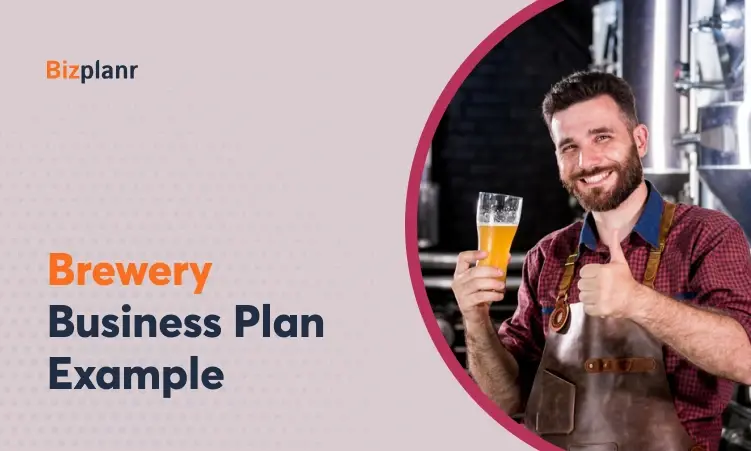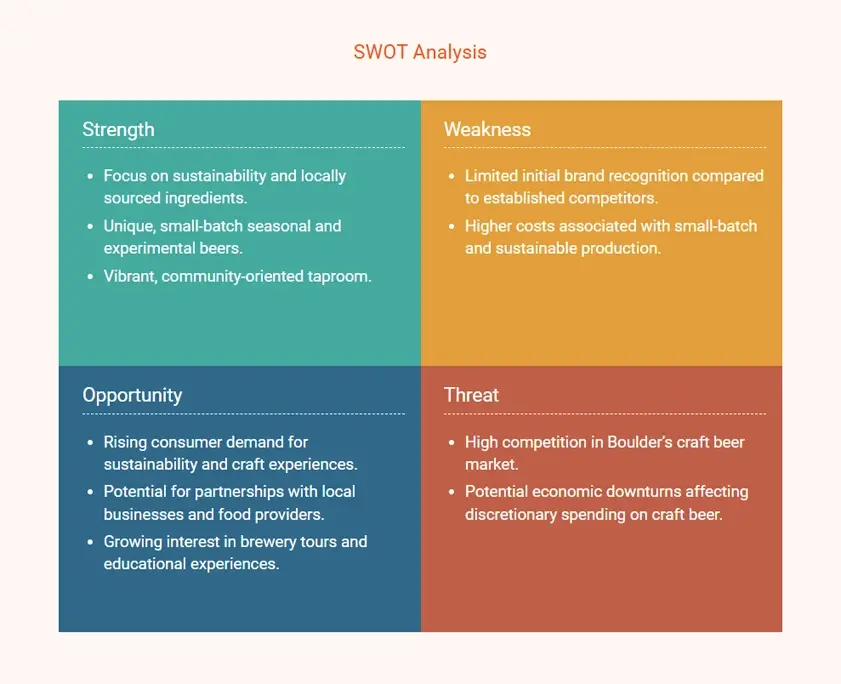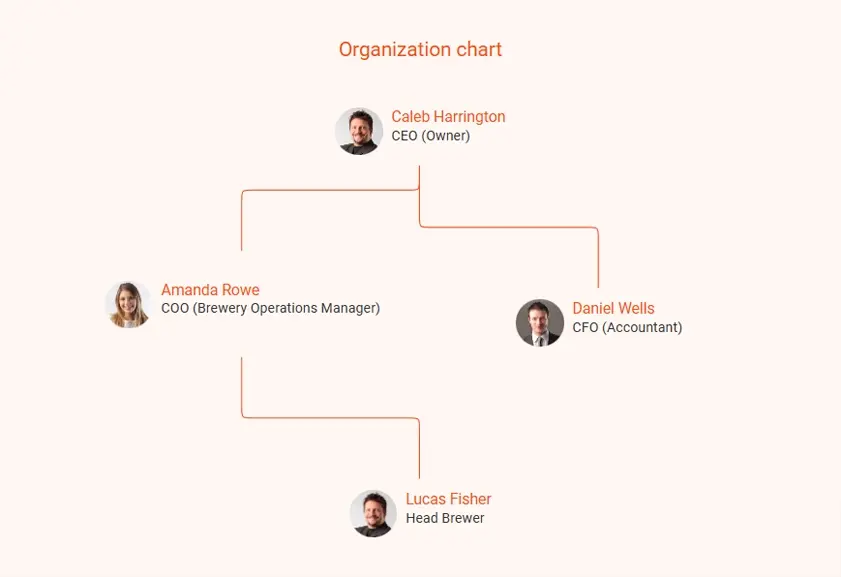🌍 Upmetrics is now available in
- Sample Business Plans
- Food, Beverage & Restaurant

How to Write a Brewery Business Plan: Free Template & Guide

Thinking about having a microbrewery? Good call.
Starting your own brewery can be an exciting and fulfilling venture as the craft beer industry continues to grow at a rapid pace!
However, you will need a well-thought-out business plan to start and navigate the intricacies of the brewing process, starting from perfect recipes to scale production and handling logistics.
Need help getting your plan in order?
Not to worry. Explore this brewery business plan that will surely help you get started and guide you on every stage of your business plan writing.
Sounds good? Let’s dive right in!
What is a Brewery Business Plan?
A brewery business plan is a professional document that outlines the entire strategy for starting and running a brewery. It includes business goals, strategies to achieve them, and financial forecasts for the next few years.
It serves as a strategic roadmap for your brewery business, guiding your business’s growth, managing its operations, and securing funding from investors or financial institutions.
Simply put, it’s not just a written document; it’s a detailed blueprint to steer your brewery toward success.
Now that you know what a brewery business plan is, let’s move forward to understand why you need to write one.
Why Do You Need a Brewery Business Plan?
If you’re looking to start a new brewery or expand an existing one, you will need a business plan. It supports you in getting your business off the ground as smoothly and effectively as possible.
Here are a few key reasons why you need a business plan for your brewery:
- A brewery business plan will let you carefully provide all the details about your brewery, including its vision, mission, objectives, product offerings, and operational aspects.
- A comprehensive plan covers startup costs, revenue forecasts, and realistic financial projections that allow you to manage cash flows better and plan for brewery expenses.
- Breweries or any businesses often encounter risks and challenges. At that time, writing a business plan will help you identify potential risks and outline contingency plans for smooth operations and finances.
- Having a well-crafted business plan is vital for securing funds from investors or banks, as it demonstrates your business strategies, financial viability, marketing efforts, and a clear path for growth.
Now, without further ado; let’s explore the primary components of a good business plan.
What to Include in Your Brewery Business Plan?
Once you start preparing a brewery business plan, you should consider including these 9 key sections in your plan:
1. Executive Summary
Your executive summary is the first section of the business plan, providing a quick introduction to the concept and goals of your brewery.
The main purpose of writing an executive summary is to attract potential investors or partners and convince them to keep reading. So, ensure that you make it simple, crisp, and engaging.
Generally, it is written at the end when your entire doc is ready. This is so because it summarizes the most important elements of your brewery business plan.
You may include details about your business idea, the type of brewing company you own, vision-mission statement, target customers, USPs, market opportunity, branding & marketing approach, and financial highlights.
2. Business Overview
As the executive summary would include a brief company overview, the business overview section is your chance to provide an in-depth knowledge of your brewery.
To plan this section, you may consider answering some of the following questions:
- What’s the legal and trade name of your brewery?
- Where is your brewery located? And why have you chosen that area?
- What is the legal structure and size of your brewery?(e.g., LLC, corporation)
- Who are the company owners?
- When and why did you start the brewery business?
- What kind of brewery do you want to open—microbrewery? A brewpub? A taproom brewery? Or a contract brewing company?
Furthermore, you may include details like what milestones have you achieved and what major sales goals you want to reach.
3. Industry & Market Analysis
The industry and market analysis section of business plan provides valuable insights into the brewery industry and the specific market niche in which your brewery intends to operate.
Remember, your market analysis would really impress potential investors or partners if you provide research-backed information in it. For instance,
“The market size of the US brewery industry stood at $34.3 billion and increased 2.8% in 2023, as well as the retail sales of craft beer reaching $28.4 billion .”
In addition to that, you may give readers a thorough understanding of your target market demographics, customer needs, key competitors(both direct & indirect), industry trends, market size & growth potential, and regulatory environment.
4. Sample Menu
Your brewery needs a great product if you want to make it thrive. So, you have to carefully draft this section, as planned menus are crucial for all breweries’ business plans.
You may start by outlining what your brewery will offer, including all the types of brews you plan to produce and serve and the varieties of foods(if any).
For example, there are multiple types of beers to select from(such as sour beers, lagers, stouts, and IPAs), so determine your niche. Also, ensure that your sample menu fits your business concept, like any brewery theme or even specific beer pairings.
If your brewery provides other extra services, including tours or merchandise options, describe them as well.
5. Sales and Marketing Strategy
The sales and marketing plan provides the strategies you’ve planned to reach new customers and keep them coming back to your brewery.
It includes USPs, social media marketing, strong web presence, email marketing, brand positioning, word-of-mouth promotions, loyalty programs, collaborations & networking with other businesses, and many more.
For easy understanding, you may refer to the following marketing strategies used to promote “Hop Haven Brewing Co.”:
Marketing strategies for Hop Haven Brewing Co.
Online marketing
Hop Haven Brewing Co. will launch a professional website that offers easy navigation, showcases your beers, and includes engaging video/blog content. This establishes Hop Haven as a thought leader.
Pre-launching events
Hop Haven Brewing Co. will organize pre-opening events for potential customers, local merchants, and press contacts. This will create buzz and awareness for Hop Haven Brewing Co. in the area.
Social media marketing
Hop Haven actively uses YouTube and social media platforms to share interesting content, including behind-the-scenes brewing processes, live events, and customer experiences.
Local promotions
Hop Haven Brewing invests in advertising via local magazines, newspapers, or radio stations to grow brand recognition in our area.
Partnerships
Hop Haven Brewing Co. tries to partner with local businesses and artisans to produce unique brews or co-host events. Doing so will improve community engagement and increase the customer base.
The employees of Hop Haven Brewing Co. will initially offer free beer samples to encourage customers to taste the quality and variety of the beer.
Loyalty programs
Hop Haven presents a membership club, seasonal discounts, or loyalty cards to provide perks, exclusive beers, or discounts to repeat customers.
This section will allow potential investors and partners to understand how you’ll market or promote your brewery once it opens.
6. Operations Plan
The operations plan involves information about the day-to-day business operations required to run your brewery smoothly.
This means you will need to summarize everything from the beer production process to the inventory management and sales tracking. For instance, you may consider asking yourself these questions:
- How many employees do I need to hire?
- What type of equipment/technology is needed for brewery operations?
- How can I manage the brewery’s supply chain, from sourcing raw materials to final product delivery?
- Who will be accountable for the administrative duties?
Answering such questions will help you convey your operational aspects with great precision.
7. Management Team
A strong management team is a key part of a brewery business plan since it outlines the people behind your business. So, you will introduce your management team in this section.
You may highlight the organizational structure, describe the roles and responsibilities of key team members, and provide their resume-styled summary, along with their expertise, qualifications, and the value they bring to your brewery.
Besides, you may give brief bios of your external advisors, consultants, or board members(if applicable).
8. Financial Plan
Preparing a financial plan can be quite stressful but it is the most essential element of your business plan. It contains detailed financial projections and funding requirements, showing investors the financial viability of your brewery.
You may provide monthly financial projections for the first year at least while giving annual projections for the next few (3-5) years.
Following are a few critical statements and reports that you should consider adding to this section:
- Brewery startup costs
- Sales & revenue forecasts
- Profit and loss statement
- Cash flow estimates
- Balance sheet
- Break-even analysis
Moreover, try to explain how you plan to get funding (e.g. SBA loans, private investors, crowdfunding, or asking family or friends), as well as the clear use of those funds.
In short, make a realistic financial plan that investors appreciate and get a better idea of the financial aspects of starting and running a brewery.
9. Appendix
In the appendix, you may attach any supplementary documents or reports that don’t fit into specific sections but support your plan.
It includes location leases, zoning compliance documents, licenses & permits, market research data, resumes of your executive team, supplier contracts, etc.
Download a Sample Brewery Business Plan
Need help writing your brewery business plan? Well, here you can download our free brewery business plan pdf to get started.
This advanced business plan template has been crafted specifically for your brewery business. With step-by-step instructions and examples, it helps you draft your own plan.
Simply import data into your editor and start writing your brewery business plan.
Start Preparing Your Business Plan with AI
Creating a comprehensive business plan from scratch can be a daunting and intimidating task. But not to worry; Upmetrics could be a great help here!
Upmetrics is a modern AI business plan generator that supports small business owners and new-age entrepreneurs to build investment-ready business plans in a snap.
It will streamline the business planning process with the help of step-by-step guides, a business plan builder, 400+ sample business plans , and financial forecasting software.
So, why are you waiting? Start preparing your plan!
Related Posts
Wine Bar Business Plan
Liquor Store Business Plan
Wine Shop Business Plan
Winery Business Plan
How to Format a Business Plan
How to Use a Business Plan
Frequently Asked Questions
Do i need a business plan to open a brewery.
Yes. You will need to have a solid business plan while opening a brewery. It helps you detail your business idea, vision, operational plans, marketing strategies, and financial forecasts. So, it’s important for securing funding, handling brewery operations, and making strategic decisions.
How much does it cost to write a brewery business plan?
The cost of writing a brewery business plan can vary based on the level of detail and complexities of your plan. If you hire any experienced business plan writer , it may typically cost you a few hundred to several thousand dollars, whereas tools like Upmetrics cost you only $7/month.
What financial projections should I include in my brewery business plan?
While financial forecasting involves multiple financial statements and projections like sales forecasts and break-even analysis, the balance sheet, cash flow statement, and income statement are considered to be three major components of a financial plan.
Are there any software tools available to help me create my brewery business plan?
Yes, there are robust tools available to help you create a brewery business plan. You may consider using our business plan software —Upmetrics. It offers online resources, business plan guides, and financial forecasting features to create a comprehensive business plan for your brewery.
About the Author
Upmetrics Team
Upmetrics is the #1 business planning software that helps entrepreneurs and business owners create investment-ready business plans using AI. We regularly share business planning insights on our blog. Check out the Upmetrics blog for such interesting reads. Read more

Turn your business idea into a solid business plan
Explore Plan Builder
Plan your business in the shortest time possible
No Risk – Cancel at Any Time – 15 Day Money Back Guarantee

Create a great Business Plan with great price.
- 400+ Business plan templates & examples
- AI Assistance & step by step guidance
- 4.8 Star rating on Trustpilot
Streamline your business planning process with Upmetrics .

- Sample Plans
- Food, Beverage & Restaurant
Brewery Business Plan
Excited to open your own brewery but feeling stuck on where to start? Our brewery business plan example and free template are just what you need. From market research to financial planning, this guide walks you through every step to create a clear and effective plan for your brewery.

The craft beer industry is experiencing significant growth, projected to reach $502.9 billion by 2025.
This shows the great opportunities for brewers to create unique, high-quality products that cater to an expanding and diverse consumer base.
But to turn your passion for brewing into a successful business, you’ll require a solid business plan. It helps you navigate the industry's complexities, manage resources efficiently, and attract investors.
Wondering how to write one?
Here’s a sample brewery business plan created by our AI business plan generator.
Let’s get started by why you need one!
Why do you need a brewery business plan?
A brewery business plan is essential whether you're starting from scratch or growing your current business. Here's why it matters:
Clarifies your vision
A business plan helps you clearly define your mission, goals, and vision , giving you a solid direction for your brewery’s growth. It also keeps your team and stakeholders aligned with the same vision.
Attracts funding
Breweries often need significant upfront investment for equipment, renovations, and operations. A detailed plan shows investors and lenders that you understand the business and its potential, boosting their confidence in your financial management.
Supports decision-making
A plan acts as a guide for making smart choices about marketing, operations, and growth. It helps you prepare for potential challenges and seize new opportunities.
Tracks progress
A business plan clearly outlines financial and operational goals, helping you measure success and stay accountable as your business grows. It also provides a clear roadmap to identify areas that need improvement or adjustment along the way.
Brewery business plan sample
Here’s the FoamForge Brewery business plan example to inspire your own brewery planning. It’s filled with practical, easy-to-follow tips to help you confidently craft each section of your plan.
Executive summary
Business name: FoamForge Brewery Location: 1216 Cascade Street, Boulder, Colorado, 80304, USA Legal structure: LLC
FoamForge Brewery is a small craft brewery based in Boulder, Colorado, known for its creative and high-quality beers. We offer a variety of styles, including IPAs, lagers, stouts, sours, and barrel-aged brews. Focused on sustainability, we use local ingredients and eco-friendly brewing practices to create bold, thoughtful beers.
At FoamForge, guests can enjoy seasonal and experimental beers, join brewery tours and educational sessions, and take part in fun community events like trivia nights, live music, and beer-pairing dinners.
Key differentiators
FoamForge Brewery distinguishes itself through:
- Sustainability: A commitment to eco-friendly practices and the use of locally sourced ingredients.
- Community engagement: Hosting events that foster connections among beer enthusiasts, locals, and visitors.
- Small-batch innovation: Offering exclusive seasonal and experimental brews that keep customers excited and engaged.
Market opportunity
The craft beer scene in Colorado is booming, with more people seeking unique, locally brewed beers and engaging brewery experiences. Boulder, known for its outdoor culture and love for craft beer, is the perfect location for FoamForge Brewery.
Our target market includes locals aged 21-50, tourists visiting the area, and businesses looking for quality craft beer partnerships.

Funding request
FoamForge Brewery is seeking $700,000 in funding to cover startup costs and initial operations, allocated as follows:
- Brewing equipment: $300,000 to purchase fermentation tanks, kettles, barrels, and packaging systems.
- Taproom renovations: $150,000 to create a welcoming community hub with a bar, seating, and unique decor.
- Initial inventory: $100,000 for raw materials, branded merchandise, and glassware.
- Marketing campaigns: $50,000 to establish brand awareness through digital marketing, events, and partnerships.
- Staffing and training: $50,000 to hire and train a team of talented individuals.
- Working capital: $50,000 for operational expenses during the initial months.
Financial projections
FoamForge Brewery anticipates strong growth and profitability within its first three years of operation:
Business description
Business concept.
Based in Boulder, Colorado, FoamForge Brewery was founded with a passion for unique beer and community connections. Specializing in small-batch breweries, including IPAs, lagers, stouts, and specialty barrel-aged beers, FoamForge offers seasonal beer tastings exclusive to its taproom.
With a focus on sustainability, local sourcing, and community engagement, FoamForge aims to make a lasting mark in the craft beer industry, while reflecting Boulder's eco-conscious and fun spirit.
Mission statement
Our mission is to forge unforgettable beer experiences by crafting innovative brews, fostering community connections, and celebrating the art of craft brewing.
Vision statement
To be recognized as a trailblazer in Colorado's craft beer industry, delivering exceptional beer and cultivating a loyal community of beer enthusiasts who value creativity and sustainability.
Future goals for FoamForge Brewery
- Scale production capacity to meet growing demand.
- Expand distribution to regional restaurants, bars, and retail outlets.
- Launch canned and bottled products for retail sales.
- Develop a membership program to enhance customer loyalty.
- Open additional taprooms in nearby Colorado locations.
Market analysis
The craft beer industry has seen exponential growth over the last decade, with a strong emphasis on locally brewed, high-quality, and innovative beers. In Colorado, one of the nation’s leading craft beer hubs, breweries contribute significantly to the local economy, attracting both dedicated beer enthusiasts and casual consumers.
As consumer preferences continue to shift toward unique and local experiences, FoamForge Brewery is well-positioned to capitalize on these trends.
Target market
FoamForge Brewery’s target market includes:
- Craft beer enthusiasts: Aged 21–50, who appreciate the art of brewing and seek innovative, high-quality beers.
- Boulder locals: Residents who value locally sourced products, sustainability, and a community-focused taproom experience.
- Outdoor enthusiasts and tourists: Visitors exploring Boulder who are drawn to unique local experiences.
- Local businesses and organizations: Companies looking to feature unique craft beers at events or through partnerships.
Competitor analysis
FoamForge Brewery operates in a competitive market, with notable local competitors including:
- Finkel & Garf Brewing Co.: Known for its straightforward, quality brews, but lacking FoamForge’s focus on sustainability and seasonal innovation.
- Twisted Pine Brewing Company: Offers a varied lineup but does not emphasize exclusive taproom experiences or sustainability as strongly as FoamForge.
- Boulder Beer Company: A long-established name with broad appeal, but with a larger, less boutique identity than FoamForge’s small-batch approach.
- Sanitas Brewing Company: Focuses on craft and innovation but lacks FoamForge’s community-driven taproom atmosphere.
- Avery Brewing Company: A well-known brand with high production volume, FoamForge differentiates itself through its boutique, exclusive beer experiences.
SWOT analysis

Organization and management
Legal structure.
FoamForge Brewery is established as a Limited Liability Company (LLC) , combining operational flexibility with liability protection for its owners.
Ownership structure
The business is owned and led by Caleb Harrington , the CEO and visionary behind FoamForge Brewery.
Key management team
- Caleb Harrington, CEO (Owner): Responsible for the overall strategy, vision, and leadership of FoamForge Brewery. Caleb brings extensive knowledge of the craft beer industry and a passion for innovation.
- Amanda Rowe, COO (Brewery Operations Manager): Oversees the day-to-day brewery operations, ensuring production quality and efficiency. Amanda has a background in operational management and craft brewing.
- Daniel Wells, CFO (Accountant): Manages financial planning, budgeting, and accounting, ensuring the financial health of the business. Daniel is a certified accountant with expertise in the food and beverage industry.
- Lucas Fisher, Head Brewer: Leads the brewing team in creating FoamForge’s signature beers and developing new seasonal and experimental offerings.
Organizational chart

Operational plan
The operational plan for FoamForge Brewery outlines the day-to-day activities, production processes, and logistical strategies. This will ensure our brewery runs smoothly and delivers a high-quality customer experience.
Production process
FoamForge Brewery’s production process focuses on quality, sustainability, and innovation.
- Brewing: The brewery will use high-quality, locally sourced ingredients to produce batch beers. This includes malts, hops, yeast, fruits and spices, and other ingredients that contribute to tasting wines.
- Quality control: Rigorous quality control will be performed, including taste testing, measuring alcohol levels, and complying with FoamForge’s flavor standards
- Sustainability: Wasted grain will be reused as animal feed or compost, and water conservation practices will be used to reduce waste.
Taproom operations
FoamForge’s taproom is the heart of the brewery, designed to create a welcoming environment for locals and visitors.
Hours of operation:
- Monday–Thursday: 3:00 PM – 10:00 PM
- Friday–Sunday: 12:00 PM – 11:00 PM
Customer offerings:
- Beer flights, pints, growlers, and kegs.
- Seasonal events such as trivia nights, live music, and beer launches.
- Bartenders and taproom assistants will ensure efficient service and engage with customers to enhance their experience.
- Taproom Manager, Emily Hart, will oversee daily operations, staffing schedules, and customer satisfaction.
Distribution and logistics
FoamForge Brewery will implement a targeted distribution strategy to maintain its boutique identity:
Local partnerships:
- Establish partnerships with select restaurants, bars, and retail stores in Boulder to distribute flagship and seasonal beers.
- Limited distribution to retain exclusivity and drive taproom traffic.
- Beer will be available in kegs for local businesses and growlers for retail customers.
- FoamForge may explore canned or bottled options for retail sales in year two.
Inventory management
Inventory management is critical to ensuring the brewery operates efficiently:
- Ingredient procurement: Ingredients will be sourced from local suppliers, ensuring freshness and supporting local economies.
- Merchandise: Branded apparel, glassware, and accessories will be stocked in the taproom, with regular inventory reviews to minimize overstocking.
Products and services
FoamForge Brewery offers a diverse range of products and services designed to appeal to craft beer enthusiasts and create memorable experiences. These include:
1. Craft beers
- Flagship brews: A selection of consistent, high-quality beers, including hoppy IPAs, crisp lagers, smooth stouts, and refreshing sours, to cater to a wide range of palates.
- Seasonal and experimental brews: Rotating offerings exclusive to the taproom, featuring innovative recipes and unique flavor profiles that keep customers excited and engaged.
- Barrel-aged specialties: Limited-edition brews aged in oak barrels to create complex and nuanced flavors, providing a premium experience for beer aficionados.
2. Packaging options
- Beer flights and pints served on-site in the taproom.
- Growlers and kegs for customers to enjoy FoamForge beer at home or for special events.
1. Taproom experiences
- A vibrant, community-centered space where customers can enjoy exclusive beers, relax, and engage with fellow enthusiasts.
- Features such as trivia nights, live music, and seasonal beer release parties to create a dynamic and inviting atmosphere.
2. Brewery tours and education
- Guided tours of the brewery to showcase the brewing process, sustainability efforts, and FoamForge’s commitment to quality.
3. Private event hosting
- Customized event hosting for corporate gatherings, celebrations, and beer pairing dinners, offering tailored experiences with FoamForge’s beers.
Marketing and sales strategy
FoamForge Brewery’s marketing and sales strategy is designed to build strong connections with its target audience, create a loyal customer base, and establish the brewery as a premier craft beer destination in Boulder.
Marketing plan
1. Local engagement
- Exclusive events: Seasonal beer launches, trivia nights, and collaborations with local food trucks and musicians to attract customers to the taproom.
- Partnerships: Collaborations with local businesses, outdoor adventure companies, and event organizers to expand reach and strengthen community ties.
2. Digital marketing
- Social media: Active presence on Instagram, Facebook, and Twitter to share engaging content, promote events, and highlight new beer releases.
- Search engine optimization (SEO): Optimized website content to improve visibility for keywords like "Boulder craft brewery" and "sustainable beers."
- Email newsletters: Regular updates to subscribers featuring new beer releases, upcoming events, and exclusive offers.
3. Membership program
- Launch a loyalty program offering perks such as early access to seasonal beers, exclusive discounts on merchandise, and invites to members-only events.
4. Public relations
- Outreach to local media and craft beer blogs to generate buzz about FoamForge Brewery’s opening and unique offerings.
Sales strategy
1. Taproom sales
- Primary revenue generated through direct-to-consumer sales in the taproom, including pints, flights, growlers, and kegs.
2. Off-site distribution
- Partnerships with select local restaurants, bars, and retail outlets to feature FoamForge’s flagship and seasonal brews.
3. Private events and tours
- Revenue from hosting corporate gatherings, celebrations, and brewery tours, offering unique experiences tailored to client needs.
Below is an outline of FoamForge Brewery’s projected financial performance for the first three years, based on expected revenue streams and operating costs.
Revenue projections
Cost projections, profit projections.
FoamForge Brewery is seeking $700,000 in funding to finance the startup costs and initial operations necessary for establishing a successful craft brewery in Boulder, Colorado. The requested funds will be allocated as follows:
Use of funds
Return on investment.
FoamForge Brewery projects strong financial performance driven by high-margin taproom sales, exclusive events, and community engagement.
By year three, the brewery anticipates achieving profitability, with an opportunity for investors to realize significant returns through continued growth or a potential future sale.
Exit strategy
FoamForge Brewery’s exit strategy outlines potential approaches to maximize value for investors and stakeholders in the future. While the focus remains on long-term growth and success, it is prudent to consider eventual exit options.
Potential exit strategies
- Acquisition by a larger brewery
- Ownership buyout
- Strategic partnership or merger
- Public offering
Download the brewery business plan template
Thinking about starting your own brewery but don’t know where to begin? We’ve got you covered! Download our free brewery business plan template PDF and start your journey with confidence.
This easy-to-use template guides you through every section of a comprehensive business plan, simplifying the process and saving you time. Get started today and bring your brewing vision to life!
Crafting a brewery business plan can feel overwhelming, but breaking it into manageable steps simplifies it.
From understanding the industry and defining your target market to creating financial projections, every section we’ve discussed is designed to set your brewery up for success.
Need help getting started? Bizplanr, our AI-powered business plan generator , simplifies the process. Just provide a few details about your brewery, and it will create a tailored, actionable business plan in minutes.
Why wait? Take the first step toward your brewing dream today!
Get Your Business Plan Ready In Minutes
Answer a few questions, and AI will generate a detailed business plan.
Generate your Plan
Frequently Asked Questions
What are the sources of funding for the brewery business plan?
There are several ways to fund your brewery business, including:
- Personal savings
- Crowdfunding
Do you need a business plan to start a brewery business?
Yes, a business plan is important for starting a brewery business. It helps you set clear goals, understand your target market, and plan your operations. A solid plan also makes it easier to secure funding by showing investors that your brewery has strong potential.
Plus, it guides your decisions as you grow, whether it’s scaling production or exploring new markets.
How long should a brewery business plan be?
The length of a business plan typically ranges from 15 to 30 pages, depending on your brewery’s size and goals.
For smaller or simpler setups, a shorter business plan focusing on core areas like operations, products, and marketing may suffice. Larger breweries or those seeking significant funding will require a more detailed plan with sections on financial projections, market analysis, and operational strategies.
How often should I update my brewery business plan?
Update your brewery business plan yearly or with major changes like market shifts, new products, expansion, or funding needs. By doing so, it ensures your business stays aligned with your goals.

As the founder and CEO of Upmetrics, Vinay Kevadiya has over 12 years of experience in business planning. He provides valuable insights to help entrepreneurs build and manage successful business plans.
Follow Vinay Kevadiya
Related Posts

How to Write a Business Plan Conclusion (W/ Example)

How to Write a Business Plan Introduction (With Example)

What Makes a Good Business Plan

IMAGES
VIDEO